中学英语重点词汇和句型用法讲解
人教版丨九年级上册英语2单元短语 句型 词汇与句式精讲
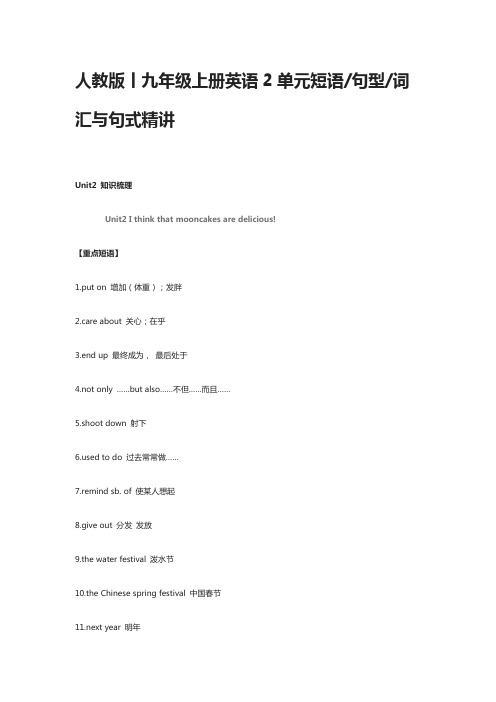
人教版丨九年级上册英语2单元短语/句型/词汇与句式精讲Unit2 知识梳理Unit2 I think that mooncakes are delicious!【重点短语】1.put on 增加(体重);发胖2.care about 关心;在乎3.end up 最终成为,最后处于4.not only ……but also……不但……而且……5.shoot down 射下ed to do 过去常常做……7.remind sb. of 使某人想起8.give out 分发发放9.the water festival 泼水节10.the Chinese spring festival 中国春节11.next year 明年12.sound like 听起来像13.each other 互相彼此14.in the shape of 以……的形状15.on mid-autumn night 在中秋之夜16.fly up to 飞向y out 摆开布置e back 回来19.as a result 结果因此20.Mother’s day 母亲节21.more and more popular 越来越受欢迎22.think of 想起;认为;思考23.dress up 装扮穿上盛装24.the importance of ……的重要性25.make money 挣钱26.in need 需要帮助处于困境中27.between …and…在……和……之间28.the dragon boat festival 龙舟节29.the lantern festival 元宵节30.like best 最喜欢31.go to …for a vacation 去……度假32.be similar to 与……相似33.wash away 冲走洗掉34.Mid-autumn festival 中秋节35.shoot down 射下36.call out 大声呼喊37.the tradition of ……的传统38.at night 在夜里; 在晚上39.one…,the other…一个……,另一个…...40.Father’s day 父亲节【重点句型】1. I think that they’re fun to watch.我认为它们看着很有意思。
高中英语高级词汇、句型及谚语
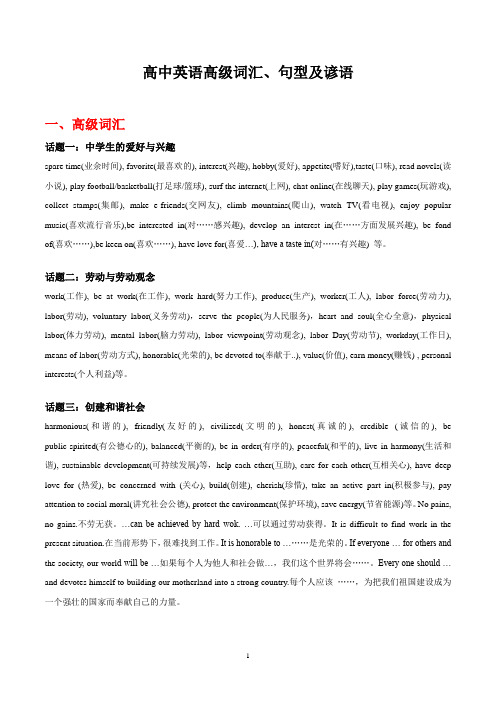
高中英语高级词汇、句型及谚语一、高级词汇话题一:中学生的爱好与兴趣spare time(业余时间), favorite(最喜欢的), interest(兴趣), hobby(爱好), appetite(嗜好),taste(口味), read novels(读小说), play football/basketball(打足球/篮球), surf the internet(上网), chat online(在线聊天), play games(玩游戏), collect stamps(集邮), make e-friends(交网友), climb mountains(爬山), watch TV(看电视), enjoy popular music(喜欢流行音乐),be interested in(对……感兴趣), develop an interest in(在……方面发展兴趣), be fond of(喜欢……),be keen on(喜欢……), have love for(喜爱…), have a taste in(对……有兴趣) 等。
话题二:劳动与劳动观念work(工作), be at work(在工作), work hard(努力工作), produce(生产), worker(工人), labor force(劳动力), labor(劳动), voluntary labor(义务劳动),serve the people(为人民服务),heart and soul(全心全意),physical labor(体力劳动), mental labor(脑力劳动), labor viewpoint(劳动观念), labor Day(劳动节), workday(工作日), means of labor(劳动方式), honorable(光荣的), be devoted to(奉献于..), value(价值), earn money(赚钱) , personal interests(个人利益)等。
仁爱版初一英语下册重点词语句型语法1
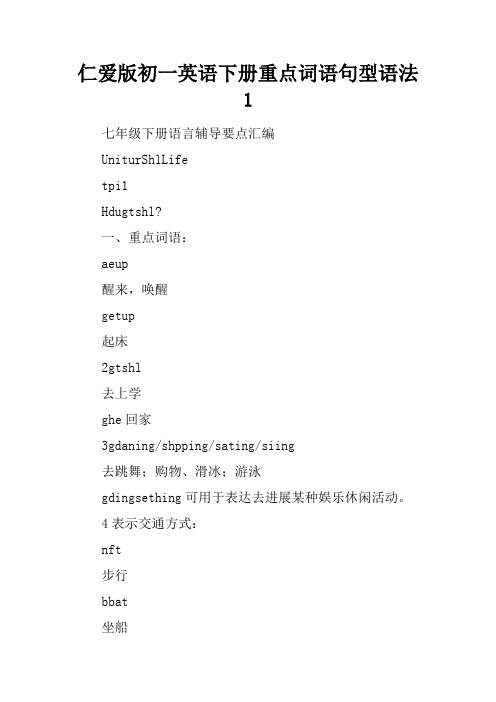
仁爱版初一英语下册重点词语句型语法1七年级下册语言辅导要点汇编UniturShlLifetpi1Hdugtshl?一、重点词语:aeup醒来,唤醒getup起床2gtshl去上学ghe回家3gdaning/shpping/sating/siing去跳舞;购物、滑冰;游泳gdingsething可用于表达去进展某种娱乐休闲活动。
4表示交通方式:nft步行bbat坐船bship坐船bair乘飞机bplane乘飞机btrain坐火车bsuba搭乘地铁bar坐小汽车bbus坐公共汽车bbie骑自行车taethesuba/bus/ar搭乘地铁;公共汽车;小汽车6driveaartr=gtrbar驾车去上班taeabustr=gtrbbus乘公共汽车去上班gtshlnft=altshl步行去上学7rideabie/hrse骑自行车;骑马8aftershl/lass放学以后;下以后9plathepian/guitar/vilin弹钢琴;吉他;小提琴plabasetball/ser/ftball 打篮球;踢足球;打橄榄球plaputergaes玩电脑游戏plaithaputer玩电脑plasprts做运动0nextt紧挨着,在…旁边1aplanfshl一幅我们学校的平面图2needas在工作日ateeends在周末3havebreafast/lunh/supper/dinner/eals 吃早餐;中餐;晚餐;正餐;一日三餐havelasses/lessns/aeeting上;上;开会4athTV/vies/gaes/theanials看电视;电影;比赛;动物readnvels/nespapers/bs看小说;报纸;书ashne’sfae/lthes洗脸;衣服6反义词:up–dn,earl–late近义词:quil–fastgetupearl早起belatefr迟到7thefirst/send/third/furthda第一;二;三;四天8leanthehuse清扫房子9表示建筑物〔尤其学校建筑物〕:ntheplagrund在操场atshl/he/table在学校;家里;桌旁inaputerr/teahers’ffie/lassrbuilding/g/librar/lab/anteen在电脑室;老师办公室;教学楼;体操馆;图书馆;实验室;食堂20arundsix’l=atabutsix’l大约在六点21频率副词:never,seld,seties,ften,usuall,alas二、重点句型:It’stietgetup该起床的时候了。
高一 英语必修2知识点汇总
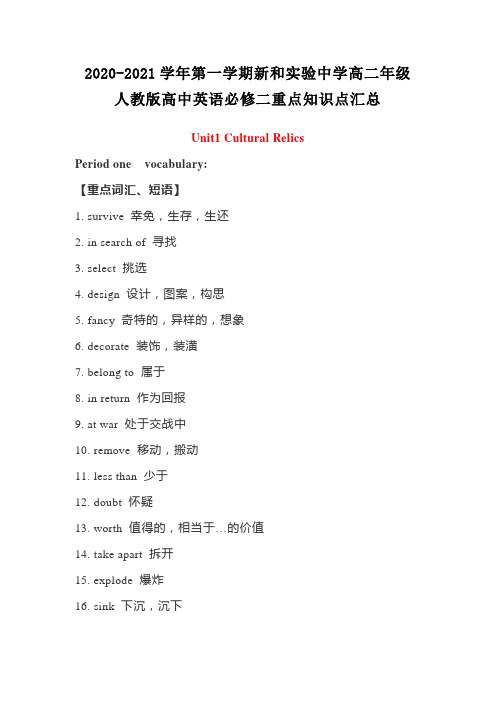
2020-2021学年第一学期新和实验中学高二年级人教版高中英语必修二重点知识点汇总Unit1 Cultural RelicsPeriod one vocabulary:【重点词汇、短语】1. survive 幸免,生存,生还2. in search of 寻找3. select 挑选4. design 设计,图案,构思5. fancy 奇特的,异样的,想象6. decorate 装饰,装潢7. belong to 属于8. in return 作为回报9. at war 处于交战中10. remove 移动,搬动11. less than 少于12. doubt 怀疑13. worth 值得的,相当于…的价值14. take apart 拆开15. explode 爆炸16. sink 下沉,沉下17. think highly of 高度评价Period two Important sentence patterns:【重点句型】1. There is no doubt that… 毫无疑问…2. when的用法was/were doing…when… 正在做某事…这时was/were about to do… when…. 将要做某事…这时had just done…when… 刚做完某事…这时3. China is larger than any other country in the world. (同一范围内的比较)She runs faster than any man in Greece. (不同范围内的比较)4. the way的用法The way___ he explained to us was quite simple. (that/which/省略) The way ___ he explained the sentence to us was not difficult. (that/in which/省略)5. worth的用法be (well) worth doing sth (很)值得做某事be worthy to be done = be worthy of being doneIt’s worthwhile to do sth= it’s worthwhile doing sth6. “疑问词+ to do” 结构,在句中做主语、宾语、表语How to do it is a question.I don’t know what to do next.7. it做形式主语It has been proved that pride goes before a fall.事实证明骄必败。
译林版牛津初中英语九年级上册全册各单元重点短语、句型、语法归纳
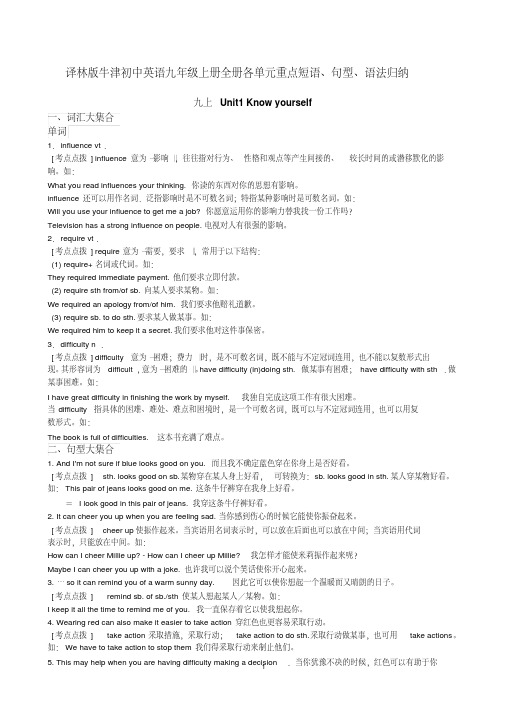
译林版牛津初中英语九年级上册全册各单元重点短语、句型、语法归纳九上Unit1 Know yourself一、词汇大集合单词1.influence vt.[考点点拨] influence意为―影响‖,往往指对行为、性格和观点等产生间接的、较长时间的或潜移默化的影响。
如:What you read influences your thinking.你读的东西对你的思想有影响。
influence还可以用作名词.泛指影响时是不可数名词;特指某种影响时是可数名词。
如:Will you use your influence to get me a job?你愿意运用你的影响力替我找一份工作吗?Television has a strong influence on people.电视对人有很强的影响。
2.require vt.[考点点拨] require意为―需要,要求‖,常用于以下结构:(1) require+名词或代词。
如:They required immediate payment.他们要求立即付款。
(2) require sth from/of sb.向某人要求某物。
如:We required an apology from/of him.我们要求他赔礼道歉。
(3) require sb. to do sth.要求某人做某事。
如:We required him to keep it a secret.我们要求他对这件事保密。
3.difficulty n.[考点点拨] difficulty意为―困难;费力‖时,是不可数名词,既不能与不定冠词连用,也不能以复数形式出现。
其形容词为difficult,意为―困难的‖。
have difficulty (in)doing sth.做某事有困难;have difficulty with sth.做某事困难。
如:I have great difficulty in finishing the work by myself.我独自完成这项工作有很大困难。
人教版七年级英语下册Unit11课文+单词+知识梳理+词汇讲解+句型解析

人教版七年级英语下册Unit11课文+单词+朗读+知识梳理+词汇讲解+句型解析milk [mɪlk] v. 挤奶cow [kaʊ] n. 奶牛,母牛;母兽milk a cow给奶牛挤奶horse [hɔː(r)s] n. 马ride a horse骑马feed [fiːd] v.(fed/fed)喂养;饲养feed chickens喂鸡farmer ['fɑː(r)mə(r)] n.农民;农场主quite [kwaɪt] adv.相当;完全quitea lot(of…)许多anything ['enɪθɪŋ](常用于否定句或疑问句)任何东西;任何事物grow [grəʊ] v.种植;生长;发育farm [fɑː(r)m] n.农场 v.务农pick [pɪk] v.采;摘excellent ['eksələnt] adj.countryside ['kʌntrɪsaɪd].乡村;农村inthe countryside在乡下;在农村yesterday ['jestə(r)dei] adv.昨天flower ['flaʊə(r)] n.花worry ['wʌri] v.&n.担心;担忧luckily ['lʌkɪli] adv.幸运的;好运的sun [sʌn] n.太阳museum [mjuː'ziəm] n.博物馆fire ['faɪə(r)] n.火;火灾frie station ['steɪʃ(ə)n]消防站painting ['peɪntɪŋ] n.油画;绘画exciting [ɪk'saɪtɪŋ] adj.使人兴奋的;令人激动的lovely ['lʌvli] adj.可爱的expensive [ɪk'spensɪv] adj.昂贵的cheap [tʃiːp] adj.廉价的;便宜的slow [sləʊ] adj.缓慢的;迟缓的fast [fɑːst] adv.&adj. 快地(的)robot ['rəʊbɒt] n.机器人guide [gaɪd] n.导游;向导gift [gɪft] n.礼物;赠品all in all总的来说everything ['evrɪθɪŋ] pron.所有事物;一切interested ['ɪntrəɪstɪd] adj.感兴趣的be interested in… 对……感兴趣dark [dɑː(r)k] adj.黑暗的;昏暗的hear [hɪə] v.(heard/hɝ:(r)d)听到;听见Carol ['kærəl]卡罗尔(女名)【重点短语】1. school trip 学校旅行2. go for a walk 去散步3. milk a cow 挤牛奶4. ride a horse 骑马5. feed chickens 喂鸡6. talk with a farmer 与农民交谈7. take some photos 照相8. ask some questions 问一些问题9. grow apples 种苹果10. show sb. around sp. 带某人逛某地11. learn a lot 学到许多12. pick some strawberries 摘草莓13. last week 上周14.In the countryside 在乡村15. visit my grandparents 拜访我的祖父母16. go fishing 去钓鱼17. sound good 听起来很好18. climb the mountains 去爬山19. play some games 玩一些游戏20. visit a museum 参观博物馆21. visit a fire station 参观消防站22.draw pictures 画画23. go on a school trip 去旅行24 visit the science museum 参观科技博物馆25. how to make a model robot 如何制作机器人模型26. gift shop 礼品店27. buy sth. for sb. =buy sb. sth.为某人买某物28. all in all 总得来说29. be interested in... 对…感兴趣30. be expensive 昂贵的31. not...at all 一点儿也不【重点句型】1.---Did you see any cows? 你见到奶牛了吗---Yes, I did. I saw quite a lot. 我见到了而且见到了很多很多2. ---Did Carol take any photos? 罗尔拍照片了吗?---Yes, she did.是的,她拍了。
上海牛津英语2B重点词汇和句型语法

Module 1 Using my five sensesUnit 1 What can you see四会单词 ( 要点要点 ) :white purple pink orange brown black其他需掌握的单词:use 用 sense感觉the beautiful over there那处outside在..rainbow外面 inside美丽的彩虹shine在.. 里面 butterfly照耀(butterflies)蝴蝶拓展词汇:gold金色silver银色black tea红茶black chocolate黑巧克力black coffee清咖啡其他要点:the sun, the moon独一无二的事物前用“ the”inside 在.. 里面: The pencil is inside my bag.outside 在.. 外面: The rainbow is outside my window.句型:1. What can you see I can see a pear.What colour is it It is yellow.2.What can you see I can see three rabbits.What colour are they They are white.3.What colour are the butterflies They are purple and yellow.Unit 2 Touch and feel四会单词 ( 要点要点 ) :watch (watches) bag soft hard rough smooth其他需掌握的单词:touch摸feel感觉Kitty’s birthday Kitty的寿辰guess猜pencil case铅笔盒open打开close关上wow 哇doll娃娃(读音区分: door门,长音有卷舌头r)拓展词汇:watch TV 看电视 schoolbag书包handbag手袋手感的词: hot-cold long-short big-small soft-hard rough-smooth句型:1.Touch this bag. Is it smooth Yes, it is.Touch this bag. Is it smooth No. It is rough.2.Is it hard Yes, it is hard.Is it hard No, it isn’t hard.Is it soft Yes, it is.Is it soft No, it isn’t.3.Happy Birthday, Kitty! Thank you.4.It ’s for you. It’s for me. It ’s for her. It’s for him.5. Do you like it Yes, I do. No, I don’t.Do you like it Yes, I like it. No, I don’t like it.其他:Pp /p/ pig, please, skip但注意“ ph”中“ p” 音就不是/p/了,“ph”是一个整体 , 音 /f/:elephant, photoUnit 3 What can you hear四会 ( 要点要点 ) :train bus (buses) car van bicycle (=bike) ship 其他需掌握的:listen 听一听hear听enjoy欣story故事beside在..旁up上面down下面the bus stop公交站wait for the bus 等公交拓展:take a bus坐公交take a No. 116 bus坐116路公交taxi (taxis)出租plane metro机地on the road在路上Shuichan Road水路Yongqing Road永清路(Rd.=Road)其他要点:bus-boop train-choo van-beep bicycle-ding dog-woof cat-meow(miaow) bird-tweet duck-quackbeside在..旁inside在..里面outside在..外面in在..里面out在 ..外面on 在.. 上面under 在.. 下面beside the window, inside the classroom, outside the restaurant, in the box,go out, out of the box,on the table, under the chair句型:1. Listen! What can you hear I can hear a train. It goes(bus-boop train-choo van-beep bicycle-ding)2. What can Ming hear Ming can hear a dog.Can Ming hear a car Yes, Ming can hear a car.Can Ming hear a ship Yes, Ming can hear a ship.Can Ming hear a bird No, Ming can’t hear a bird.3. Here it comes!它来了!“Choo⋯Choo⋯”其他:Tt /t/ tiger, taste, too但注意“ th”中“ t” 音就不是整体: this, that ; three, tooth, teeth/t/了,“th ”是一个“tr”中“ t ” 音也不是/t/了 ,“tr”是一个整体:tree, trash, trick但注意“ dr ”中“ d” 音不是了,“ dr ”是一个整体:dress, dream, dropModule 2 My favourite thingsUnit 1 Things I like doing四会 ( 要点要点 ) :run skate hop skip ride a bicycle like其他需掌握的:favourite最喜的 thing西 too 也 together一起 sing with me 与我一起唱(sing 可 dance, write⋯)拓展:ski 滑雪 play football踢足球 play basketball打球 play volleyball打排球play tennis打网球play table tennis / ping pong打球 play yo-yo玩溜溜球 play Kongfu打功夫 do Yoga 做瑜伽其他要点:关于 +ing:1)直接加 ing: doing, seeing, skiing, eating, flying, drinking, singing,jumping, drawing, reading2) 去 e: riding, writing,skating, dancing, coming, making, taking,shining, using3) 尾双写 : running,hopping,skipping,swimming, sitting,cutting,having, making, taking句型:1. Do you like running Yes, I like running.No, I don’t like running.I like hopping.Do you like running Yes, I do.No, I don’t.I like hopping.2. I like flying.I like flying, too.Let ’s go flying together. (flying可成 eating, dancing, singing⋯⋯)其他: Gg音 /g/ girl, frog注意g 有音 /d?/ orange, huge做辨音目要一来判断哦Unit 2 My favourite food四会 ( 要点要点) :salad chicken carrot banana fish(“ 肉”不可以数,“ ” 复数同形,指的种可数fishes)其他需掌握的:food食品soup meat肉noodles面条rice米pizza披hamburger堡包yummy美的biscuit干cookie曲奇cake蛋糕拓展:make salad做色拉fruit salad水果色拉vegetable salad蔬菜色拉eat somefish吃一些鱼肉句型:1. What do you like eating I like eating salad.What do you like eating I like eating bananas. (注意用复数)2.What do you like doing I like eating. I like eating carrots.What do you like doing I like singing. I like singing Do-Re-Mi.3.What do you like eating4.I like chicken. I like carrots. I like eating chicken and carrots.其他:Hh发音 /h/ hand, hen, hot“th”整体:this, that; three, tooth, teeth“ch”整体: chair, chick, children“ph”整体: elephant, photo, telephone“sh”整体: sheep, shine, show“wh”整体: what, where, when, whichUnit 3 Animals I like四会单词 ( 要点要点 ) :animal giraffe (giraffes) snake elephant zebra (zebras)其他需掌握的单词:tail 尾巴 wolf(wolves)狼fox(foxes)狐狸hippo(hippos)河马 mouse (mice)老鼠wild animals野生动物farm animals牧场动物insect昆虫 in the toy shop在玩具店里拓展词汇:leaf(leaves)叶子a long neck一个长脖子 a long body一个长身体 a long nose 一个长鼻子fan扇子yo-yo溜溜球skateboard滑板PSP, Gameboy游戏机名称句型:1.What are they They are zebras.2.What do they like eating They like eating grass.3.Do you like zebras Yes, I do. No, I don’t.4.Look at the snake. It looks like a rope.Look at the snakes. They look like ropes.I like the elephant. The ears look like fans. The eyes look like balls. The teeth look like knives.5.May I have one .May I have a toy pig .6. I like it very much.(单数,我很喜欢它) I like them very much.(复数,我很喜欢它们 )Module 3 Things around us Unit 1 The four seasons四会单词 ( 要点要点 ) :spring warm春天温暖的summerhot热的夏天 autumncool秋天凉爽的wintercold冬天冷的其他需掌握的单词:season 季节 outside在外面inside in spring在春天in summer在夏天eat fruit吃水果make a snowman (在里面 (inside the room) veryin autumn在秋天in winter复数 snowmen) 做一个雪人特其他在冬天句型:1.Spring, spring, nice and warm. Spring, spring, I like spring. Summer, summer, sunny and hot. Summer, summer, I like summer.2.I like riding my bicycle in the park.I like swimming in the water.I like flying a kite in the park.I like skating on the ice.其他:Ss /s/ sun,bus注意“ sh”是一个整体: shirt, short, shine/z/ is, bicycles, zebrasUnit 2 Rules四会单词stop停(要点要点 ):go去(come来)wait等待light灯let’s=let us让我们其他需掌握的单词:rule 规则 look at看看in the children’s garden在儿童花园里road路(Yong Qing Road...)stop by the road在路边停wait to go等着去cross the road过马路cars go past轿车经过all very fast都很快(slow慢的)拓展词汇:traffic light交通灯turn转left左right右policeman警察 (复数policemen)句型:1. Look at the light. It’s red. Let’s stop.Look at the light. It’s yellow. Let’ s wait.Look at the light. It’s green. Let’s go.其他:Mm /m/ mouth, warmNn /n/ nose, tenUnit 3 My Clothes四会单词 ( 要点要点 ) :trousers裤子 sweater毛衣 shirt衬衫 (blouse女式衬衫 ) coat大衣 have 有其他需掌握的单词:clothes衣服 dress (复数 dresses) go to school去学校 (go home 回家 ) together一起time for class上课时间到了 (time for school, time for bed...)my new skirt我的新裙子 (skirt半身裙 )拓展词汇:a pair of一双 / 一副 (a pair of gloves一帮手套 ; a pair of shorts一条短裤 ; a pair of trousers一条长裤 )句型:1.I have a sweater. I have a dress. I have a shirt. I have a coat.2.What do you have for spring I have a sweater for spring.What do you have for summer I have shorts for summer. ( shorts for summer.)What do you have for autumn I have trousers for autumn. ( of trousers for autumn.)What do you have for winter I have a coat for winter.3. Listen! What can you hear, AliceI can hear a dog.4. Look! He has a sweater, too.5. Come in, please.请进。
牛津译林版高中英语必修第二册Unit2重点词汇及句型教学课件

2.update vt&n. 更新 update information 更新信息 a news update 一则简明新闻 up to date 最新的 out of date过时的
重点词汇
13.prevent vt.阻止,阻碍 →preventable adj.可阻止的;→prevention n. prevent...from...阻止某人做... preventable disease(s)可预防的疾病
14.injury n.伤害 →injure vt使受伤 →injured adj.受伤害的 be badly injured 严重受伤 do an injury to sb. 使某人受伤害
ห้องสมุดไป่ตู้
重点词汇
5.reduce vt.减少,缩小→reduction n.减少 reduce...to...减少至 reduce...by...减少了 be reduced to doing sth 沦落为...
6.routine n.常规;惯例→routinely adv. 例行地 a routine check 例行检查 break the routine 打破常规
13.exist vi存在→existence n.存在,生存 exist on 依靠...生存 there existed 某地有 come into exitence 开始存在
重点词汇
14.breathe vi&vt 呼吸→breath n.呼吸 breathe in 吸入 hold one's breath 屏住呼吸 out of breath 气喘吁吁 lose one's breath 喘不过气
- 1、下载文档前请自行甄别文档内容的完整性,平台不提供额外的编辑、内容补充、找答案等附加服务。
- 2、"仅部分预览"的文档,不可在线预览部分如存在完整性等问题,可反馈申请退款(可完整预览的文档不适用该条件!)。
- 3、如文档侵犯您的权益,请联系客服反馈,我们会尽快为您处理(人工客服工作时间:9:00-18:30)。
中学英语重点词汇和句型用法 1. 提建议的句子: ①What/ how about +doing sth.? 如:What/ How about going shopping? ②Why don’t you + do sth.? 如:Why don’t you go shopping? ③Why not + do sth. ? 如:Why not go shopping?
④Let’s + do sth. 如: Let’s go shopping
⑤Shall we/ I + do sth.? 如:Shall we/ I go shopping? 2. first of all 首先 to begin with 一开始 later on 后来、随 3. also 也 而且(用于肯定句)常在句子的中间 either 也(用于否定句) 常在句末 too 也 (用于肯定句) 常在句末 4. see sb. / sth. doing 看见某人正在做某事 强调正在发生 see sb. / sth. do 看见某人做了或经常做某事 如: 如: She saw him drawing a picture in the classroom.她看见他正在教室里画画。
5. too many 许多 修饰可数名词 如:too many girls too much 许多 修饰不可数名词 如:too much milk much too 太 修饰形容词 如:much too beautiful 6. used to do sth. 过去常常做某事 否定形式: didn’t use to do sth. used not to do sth. 如:He used to play football after school. 放学后他过去常常踢足球。 Did he use to play football? Yes, I did. No, I didn’t. He didn’t use to smoke. 他过去不吸烟。 7. 反意疑问句 ①肯定陈述句+否定提问 如:Lily is a student, isn’t she? Lily will go to China, won’t she?
②否定陈述句+肯定提问 如:She doesn’t come from China, does she? You haven’t finished homework, have you?
③提问部分用代词而不用名词 如: Lily is a student, isn’t she? ④陈述句中含有否定意义的词 如:little, few, never, nothing, hardly等。
其反意疑问句用肯定式 如: He knows little English, does he? 他一点也不懂英语,不是吗? They hardly understood it, did they?他们几乎不明白,不是吗?
8. be interested in sth. 对…感兴趣 take an interest in be interested in doing sth. 对做…感兴趣 如:He is interested in math, but he isn’t interested in speaking English.
他对数学感兴趣,但是他对说英语不感兴趣。 9. interested adj. 感兴趣的,指人对某事物感兴趣,往往主语是人 interesting adj.有趣的,指某事物/某人具有趣味,主语往往是物 10. in the last few years. 在过去的几年内 常与完成时连用 如: I have lived in China in the last few years. 在过去的几年内我在中国住。
11. how to swim 怎样游泳 不定式与疑问词连用: 动词不定式可以和what, which, how, where, when 等引导的疑问句连用,构成不定工短语。如:
The question is when to start. 问题是什么时候开始。 I don’t know where to go. 我不知道去哪。 I don`t know what to do next.. 我不知道下一步做什么。 12. make sb./ sth. + 形容词 make you happy make sb./ sth. + 动词原形 make him laugh 13. it seems that +从句 It seems + adj…… It seem + to be 看起来好像…… 如:It seems that he has changed a lot. 看起来他好像变了许多。
14. 看起来好像…sb. seem to do sth. He seems to feel very sad. it seems that +从句. It seems that he feels very sad. 他看起来好像很伤心。
系动词不能独立作谓语,要和表语一起构成谓语。常用的连系动词有:look, feel, be, become, get, turn, smell, taste, stay(保持), kept等。连系动词除be 和become 等少数词可接名词作表语外,一般都是接形容词。 如:
They are very happy. He became a doctor two years ago. She felt very tired. sb. with sth. 帮某人某事 help sb. (to ) do sth. 帮某人做某事 help sb out 帮某人摆脱困难 help do sth 帮助做某事 help with sth. 如:They help with this problem. She helped me with English. 她帮助我学英语。
She helped me (to) study English。 她帮助我学习英语。
They help you relax. 他们帮助你放松
16. fifteen-year-old 作形容词 15岁的 fifteen-year-olds 作名词指15岁的人 fifteen years old 指年龄 15岁 如:a fifteen-year-old boy 一个15岁的男孩
Fifteen-year-olds like to sing. 15岁的人喜欢唱歌。 I am fifteen years old . 我是15岁。 17.不再 ①no more == no longer 如: I play tennis no more/ longer.我不再打网球。
②not …any more == not …any longer 如: 18.语态: ①英语有两种语态:主动语态和补动语态 主动语态表示是动作的执行者 被动语态表示主语是动作的承受者 Cats eat fish. (主动语态)猫吃鱼。 Fish is eaten by cats. (被动语态) 鱼被猫吃。 ②被动语态的构成 由“助动词be +及物动词的过去分词”构成 助动词be 有人称、数和时态的变化,其变化规则与be 作为连系动词时完全一样。
时态 被动语态结构 例句 一般 现 在 时 am
are +过去分词 is
English is spoken in many
countries.
一般 过 去 时 was +过去分词 were + 过去分词 This bridge was built in 1989.
情 态 动 词 can/should may +be+过去分词 must/……
The work must be done right
now.
③被动语态的用法 当我们不知道谁是动作的执行者,或者没有必要指出谁是动作的执行者,或者只需强调动作的承受者时,要用被动语态。
19. allow sb. to do sth. 允许某人做某事(主动语态)如: Mother allows me to watch TV every night. 妈妈允许我每晚看电视。 be allowed to do sth. 被允许做某事(被动语态)如: LiLy is allowed to go to Qinzhou. 莉莉被允许去钦州。 Sb. allow doing sth. 某人允许做某事 20. get their ears pierced 穿耳洞 让/使(别人)做某事 get sth. done(过去分词) have sth. done 如: I get my car repaired. == I have my car repaired. 我让别人修好我的车
21. enough 足够 形容词+enough 如:beautiful enough 足够漂亮 enough+名词 如:enough food 足够食物 enough to 足够…去做… 如: I have enough money to go to Beijing. 我有足够的钱去北京。 She is old enough to go to school.她够大去读书了。 22.倒装句: So+助动词(be/do/will/have)/情态动词+主语 意为:…也是一样 So +主语+be/助动词/ 情态动词 是呀,表示赞同别人的观点(陈述语序) Neither + be /助动词/ 情态动词+主语 …也不一样(用于否定句) 如:He has been to Beijing. So have I. It’s a fine day. So it is. She doesn’t like eggs. Neither do I. She is a student. So am I. 她是一个学生,我也是。 She went to school just now. So did I . 她刚才去学校了,我也是
She has finished the work. So have I . 她已经完成了工作,我也完成了。
She will go to school. So will he. 她将去学校,他也是。 the test 参加考试 pass the test 通过考试 fail a test 考试失败 24. have an opportunity to do sth. 有机会做某事
